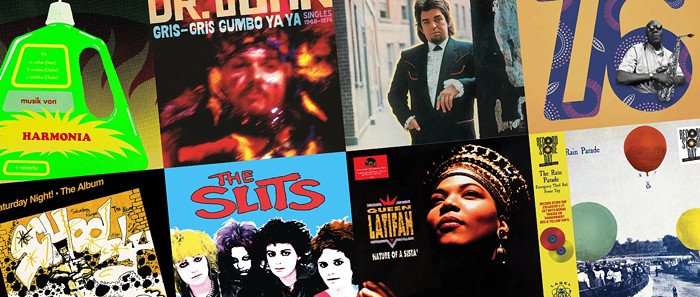Despite the fact that you guys were a DC band, there was a time when I think I saw the Dismemberment Plan play the Northwest more than any other band. You toured through Seattle so often before breaking up. Now, Seattle is the only West Coast date on the reunion tour (so far). Why do you love Seattle so much?
One thing, when Emergency & I came out, KEXP really had its back. At the time, we were still playing in a lot of towns to about 10 to 40 people. I would say Seattle, because of KEXP, was one of the first cities where it was actually 150 people, which at the time was like "WOW!" Not just your friends who are kinda, "Oh God, they're back in town again." I think Seattle and Portland, especially at that time, were the most visited rock-and-roll scenes of the West Coast, and the Seattle scene is a great deal more outgoing. There are great bands that come and go in Portland and never tour, ever. In fact, I think there are probably quite a few that don't even put out a record. It was just the odds—Seattle had the most robust music scene.
Am I wrong in believing that you are having more success and bigger audiences for this reunion tour than you've ever had in the past?
That is absolutely true. Obviously, the way that people take in information has changed 100 percent in the last seven years—it's one of the craziest cultural shifts I'll probably ever see in my lifetime. So is it par for the course, with the emphasis on live shows now? Back in the day, it took a year to get your hands on a Minutemen record. Now, it's almost like the band still exists in this weird digital way—it's all there for people to discover. The bottom line is yes, absolutely, but I don't know if other bands have gotten crazy bumps, too. I figure there's a rising tide that's lifting all boats, especially the old crappy boats that were on the beach.
So basically you're saying the Dismemberment Plan is an old crappy boat kept afloat by technology.
Oh yeah, please. There's your pull quote [laughs]. But yes. Just in terms of absolute numbers, it's astounding. Who are you people? Where were you all my life?
I was gonna ask! Do you ever want to grab them and say, "Where the fuck were you 10 years ago when we put out this record the first time?"
[Laughs] I think that would make for some interesting stagecraft! Maybe I could go out there and pull some weird Andy Kaufman performance art, like [speaking in a funny voice] "Where were you..." I don't know, things have their time. The fact that we were actually able to quit our day jobs for a little while and be touring musicians—I mean, we were poor but we were able to make it happen—that's incredible. No, I'm not out there like, "Damnit, you're late!"
The fact that they're there at all, I suppose.
Right? It's a miracle! It's great. It really is incredible.
In 2009, you posted to your website (www.travismorrison.com) that you had retired, in big, bold, moving letters. It's still there. But obviously you're not "retired."
[Laughs] That got a whole lot more attention than the record I put out the year previous! I was like, well, if you were that into me, I was working! I had moved to New York City and it was clear that the Hellfighters [his post-Dismemberment Plan band] didn't have enough legs. I was a little fatigued on being in bands anyway, and I was super psyched to move to New York City and have no obligations. I had no answer for anyone who was like, "Do you have a record coming out? Are you gonna play some shows?" I was just like, "No, I'm gonna drink beer and watch bands."
Maintaining some kind of solo career had become unpleasant and I just thought it would be funny to say, "I'm retired!" and then just keep making music anyway. The thing I did with my webpage, every once in a while I get someone telling me, "That's one of the best artistic things you've ever done," with the moving characters.
I would punch that person! I mean, it's funny, but I'd say, "C'mon! Did you hear The Dismemberment Plan Is Terrified?"
[Laughs] I know what they mean, though. I dig that, when someone just seizes on one little thing that you did that had a little bit of flair. I can accept that. [Pause] And then I punched him in the balls!
You should end every sentence with that: "And then I punched him in the balls."
[Laughs] Well, wait until I get on my whole kick about how people were late coming to our shows. Punching in the balls will happen.
That's gonna play into the Andy Kaufman thing. I'll remember to bring a camcorder to the Seattle date.
Yeah, you might want to bring a codpiece, too.
I don't have balls.
You probably still don't want to get punched there!
That's true! So you do know a thing or two about women.
[Laughs] "Travis Morrison Knows Women."
That's so gonna be the headline.
[Laughs] Yeah, I really don't think I'm gonna read this interview...
How has it been revisiting your material?
Good, actually. It hasn't been depressing [laughs]. A couple of songs I find a little jejune, a little immature; unfortunately, those are some of the popular songs. That's a bummer. I can't connect with those songs at all. But I think that a lot of it is actually surprisingly nice—without being wimpy—and openhearted. It actually was a relief. I think that might've helped it age somewhat, that the songs are fairly generous spiritually. It's a relief that I can connect to 85 percent of it. And the rest of it, you know, people can just rock out to it and that's cool. Like the song "Time Bomb," I just think it is so corny now. It's almost like the only way I can sing it is gothing it out, it's kind of ridiculous.
Now you can treat it like it's just a song, maybe you don't even have to be able to relate to it?
No, I still have to be able to feel it. It has to make sense to me. I don't mean that if it doesn't make sense to me, I won't let it pass my lips again. But there's definitely a difference between "I'm singing this because I know everyone's gonna rock out to it" and the stuff that I can really emotionally connect to. I think something extra does happen with those songs. The bottom line is that I'm not embarrassed, and that is all you can ask for.
I think we were a little out of step with the tenor of music in the late 1990s. We were slightly light in the pants. There was a philosophical reserve to a lot of our songs. There was a certain kind of flippancy to it. I don't want to say it was maturity, but a lot of it was unwillingness to really go... full retard.
There's the pull quote!
You know that quote from the movie Tropic Thunder, where the "super actor" is telling the "not really that good actor" what was wrong with his portrayal of a retarded person? He's like: "The problem was you were too invested, and you went full retard. You never go full retard!" You could argue that a lot of the Plan's catalog did not go full retard, and that helped it age.
Really great rock and roll can invoke intense emotional states and then have this little trapdoor outside of it without being too distant. You go one way too far and it's mawkish; you go the other way too far and it's like a puzzle and there's nothing to tap into. So I don't know, now that I've finished explaining why our music is great [laughs].
Because you didn't go full retard.
[Laughs] And now we can! We saved a little retard for later.
Will there be new material?
We've agreed that we've gone as far as we can go playing these songs, except for a couple of festival offers—some of which are just incredible culturally and some of which are, like, a truckful of money. Both are awesome. You try to get both at the same time—but if you can't, you alternate.
After that, with the music stuff, a lot of it can only be done by everyone sitting in the same room doing hours of unproductive work, making bizarre sounds with a pedal, and then something happens. Is that possible for us? I'm not really sure. I would begin to try, but we definitely reserve the right to just be like, "It sucks." So it will be completely unplanned and organic—if it happens. ![]()




















